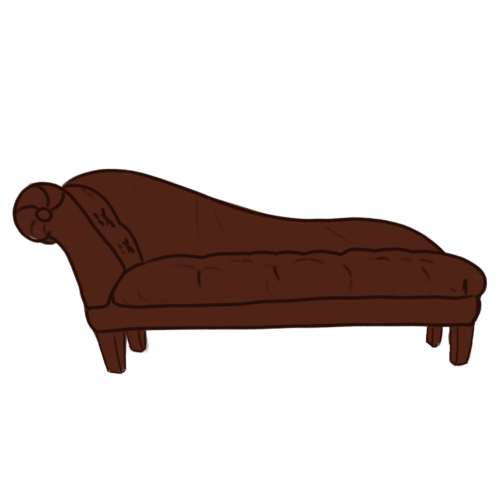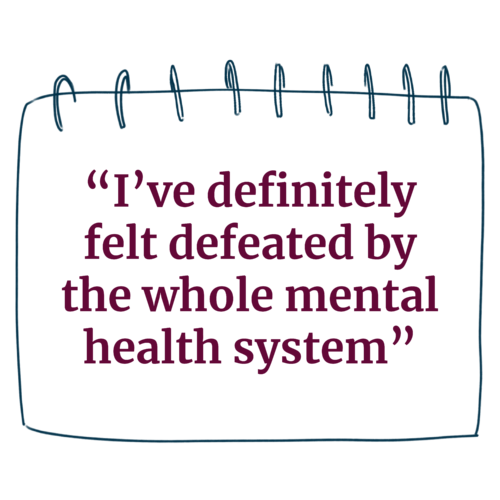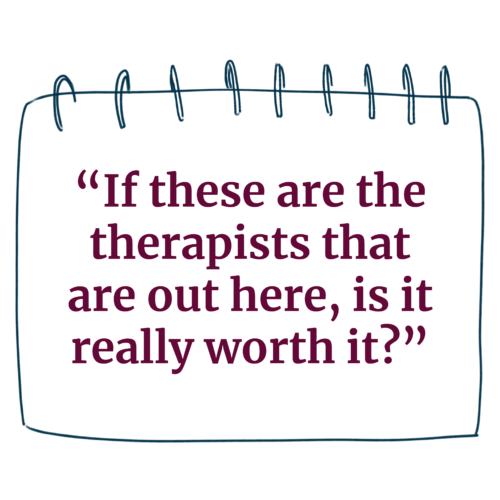When trying to get professional help, students of colour say they’ve been met with many apathetic and unethical therapists
Words by Mariyah Salhia
Visuals by Laila Amer
At the beginning of 2020, Zaina Antoun* was visiting friends in London, England. Just a few days into her trip however, she found herself in an Uber on the way to the hospital. She woke up that morning with her heart pounding irregularly fast and moments later, she lost her vision and fainted. She remembers struggling to calm herself down, feeling confused and scared.
This happened about a week after she started using an anti-anxiety medication, prescribed by her white doctor. When she told him about what happened to her in London, he was nonchalant and told her to report back if it happened again.
When she told him about her heart beating too fast, he told her it was just a side effect of her medication. It wasn’t until she fainted for a second time and hit her head, that the doctor started paying attention. It was after this incident, she learned she’d developed panic disorder and that she was actually having heart palpitations, not just anxiety.

When Antoun, who graduated from Ryerson’s biomedical sciences program in 2020, finally moved out of her parents house after starting university, she decided to look for a new family doctor and therapist. She knew going to therapy would be hard, but she didn’t realize that finding a therapist that met her needs would be so difficult.
For racialized students at Ryerson, getting to therapy is often a long, tumultuous road. From overcoming their families’ perception of mental health, to staring down their own internalized shame about asking for help, making the decision to go to therapy is often a tiring and calculated one. But for many students of colour, therapy doesn’t always work, and that experience can make them feel like it’s their fault.
Students say this is because therapists lack the necessary understanding of how racialized people experience mental illness—often ignoring family dynamics and delegitimizing their experiences. Consequently, when therapy fails, this can lead to guilt, confusion and more shame about their mental health.
A 2018 study in the Canadian Journal of Psychiatry found that people of colour in Ontario not only face a lack of access to mental health resources, but also a lack of culturally aware professionals.
Angela Facundo, a psychoanalytic psychotherapy candidate at the Toronto Institute for Contemporary Psychoanalysis, says people can be met with barriers when trying to go to therapy, such as the costs. According to Alexander Cahuas, a clinical social worker and therapist in Surrey, B.C., it can be hard to find affordable therapy because many services, including hospital-based ones, have too many clients.
Another barrier is the cultural gap in therapy, where the basis of education and understanding is rooted in the Western idea of family dynamics, which stem from individualism rather than community. “When somebody enters into therapy, it’s almost as if they’re forced to make a choice,” says Facundo. “Because anything that they say in that space is a betrayal to their family.” They say this can lead to a resistance to therapy.
“I don’t think it has anything to do with being a person of colour until I talk about my experiences,” Antoun says. It was only after talking to her white friends that she realized what she was going through in therapy wasn’t the norm for her white counterparts.

hen Christina Graham* was 14 years old, she attended a family therapy session with her mom and brother. They were talking to their therapist—an older white man—about her brother’s severe anger issues and violence toward her. Instead of understanding the situation and offering solutions, she remembers her therapist telling her mother, “he hits her because she has an attitude.”
He then turned to Graham and said, “If you don’t lose this attitude, you’re going to be with someone who beats you.” For Graham, this became the most disappointing encounter she’s ever had with a therapist.
Ever since she was a child, Graham has had buried feelings of confusion and anxiety that come from her family’s Indigenous heritage, which she knows very little about. Her great-grandmother is a residential school survivor, but lost her connection with her family and reserve. Due to past trauma, her family doesn’t talk about their experiences or remember their ancestry. As a result, Graham grew up without a sense of identity, being disconnected from her Indigenous culture and unable to learn more about it.
“My great-grandma is true to case studies,” she says. “She never talked to any of her family after she left home. I’ve kind of been raised with those mentalities.” When Graham would try to talk to therapists and social workers about her generational trauma, many were dismissive of her concerns and experiences. She says this turned her away from seeking therapy.

Cahuas says therapy can be really difficult for Indigenous people. “A lot of therapy is based on Eurocentric concepts of intellectualizing the challenge.” He says a lot of Western therapy puts an emphasis on telling people what their problem is and guiding the conversation based on what the therapist thinks they’re hearing.
Facundo says that while there is now a bigger push to recognize and reconcile some of the systemic racism built into therapy, their field—psychodynamic psychoanalysis, a form of therapy that focuses on unconscious behaviour and emotions —has a historically bad reputation with women and people of colour. In 2019, the American Journal of Psychotherapy reported that because there is no training on how to talk about the complexities of race and how it affects mental health, in clinical training programs, race becomes a problem area for many professionals,
Graham says many of the professionals she spoke with didn’t want to talk about her family’s heritage or about intergenerational trauma. “They would shift the conversation away,” she says. “And I just kept running into this wall of therapists not getting it.”
After these negative experiences with therapy, she avoided talking to mental health professionals for years. But in her adulthood, Graham realized she needed help. With her partner’s support, who told her they wouldn’t be able to have a relationship if she didn’t seek out professional help, Graham decided to try therapy once again.
She tried using therapy services when she was a student at Algonquin College between 2017 and 2018. Graham remembers the waitlist for a session with an on-campus counsellor being long and when she finally got to sit down in the chair across from one of them, the therapists were dismissive. When she spoke about school-related anxiety, the therapist said, “Well, you’re in college, it’s going to be hard.”
That’s why when she got to Ryerson, she never used any of the mental health resources available through Ryerson’s Centre for Student Development and Counselling (CSDC). Instead, she used psychology-focused magazine and website Psychology Today, and contacted as many therapists as she could. Graham was met with either unsuccessful consultations or a message telling her they wouldn’t be taking on any new clients.
Cahuas says because therapists are taking on more clients with less government funding, finding a professional who is willing to dedicate enough time to one client is difficult.
“I’ve definitely felt defeated by the whole mental health system,” says Graham.
After roughly 10 failed attempts at seeking help from social workers, psychologists and psychiatrists, she was ready to give up. “If these are the therapists that are out here, is it really worth it?”
She even tried omitting her struggles with her Indigenous heritage in a few of her trial sessions and still found that the people she spoke to weren’t hearing her.
Facundo says therapy is a very individual experience; a professional may work for one issue, but not another. They say it’s important to pay attention to how the therapist is making you feel when you’re in a session. If you feel like you aren’t going to be able to make a positive shift with that person after trying to work through it with your therapist, then it might be time to find a new professional.
Graham was finally able to find her current therapist after two years of searching. One of the main reasons she was able to connect with them was their common history—they both have grandparents who are residential school survivors.
“That’s been really nice, because I can talk about things like, how that probably affected my relationship with my mom and stuff like that. And he gets it.”

hmed Murtaza started looking online for resources to help manage his anxiety in the first year of his degree in 2018. He remembers being met with a variety of colourful infographics, some instructing him on proper time management skills, some giving advice about how to meditate his stress away and others listing breathing exercises for anxiety. After more research, he found work booklets designed to better mental health. And then, article after article about how important prioritizing mental health is.
What was missing, however, were tangible resources, like accessible therapy.
The now-third-year mechanical engineering student, who is currently working on his second undergraduate degree, took one look at the slew of information he had access to and felt overwhelmed. So he decided to get help through the CSDC instead.

Using school resources to access therapy seemed like the easiest choice for Murtaza. It was affordable and he wouldn’t have to talk about it with his parents. As a first-generation immigrant, he knew his parents wouldn’t understand what he was going through.
“For my parents, things like depression or attention deficit disorder (ADD) or attention defecit/hyperactive disorder (ADHD) don’t exist until you’re completely incapacitated,” Murtaza says.
An issue he discovered when he was in his therapy sessions was that his counsellor kept emphasizing the importance of family as a support system, which Murtaza felt was not an option for him. “If I discuss my counselling with my parents, I will never hear the end of it,” he says. “And my entire extended family would know.”
Coming from an immigrant family, Murtaza knows they’ve made sacrifices for him and finishing school is their ultimate goal for him. While their expectations put a strain on his mental health, he also worries about not meeting his own expectations for himself, like graduating on time. He says growing up close to his family and community, there was no separation from himself and what his family expects of him—it’s all intertwined.
According to Facundo, this is called individuation: the process of separating one’s identity from their family’s. This is often something racialized people have to work through in therapy; they have to figure out how to prioritize their wellbeing while meeting their family’s expectations for them. “You can’t necessarily draw boundaries [with family members] without doing violence to the culture from which you came,” says Facundo. They add that in therapy, you can learn how to draw those boundaries.
But even after Murtaza decided to consult a therapist through Ryerson, he wasn’t feeling any better. He remembers getting advice from a counsellor about mindfulness-based cognitive therapy, which focuses on breathing techniques and meditation. When those didn’t work, he felt like he wasn’t working hard enough at the coping mechanisms he was being told to use.

“I felt even more anxious,” he says. “Is there something I’m doing to self sabotage?”
After going through his experience with the school counsellor, he tried consulting a South Asian psychologist. Yet Murtaza ran into another problem: because the psychologist was closer in age to his parents, he felt like there was a generational gap in his understanding of some of the things he was going through. Particularly, the pressure to perform academically.
“There was this sort of generational dismissal of some of the issues I brought up,” he says. The attitude the therapist had was that not going through the struggle of immigrating like his parents meant he didn’t have any real problems.
When Murtaza talked about his parents with the psychologist, the therapist started relating more to Murtaza’s parents than to him. This led to Murtaza suspecting the therapist was telling his parents about what was discussed in their therapy sessions, despite Murtaza being an adult. This is a breach of confidentiality according to Policy I-5 of the College of Psychologists of Ontario, which oversees all psychologists and psychological associates practice. After about a month of sessions, he stopped seeing the psychologist.
Facundo says this can happen when people talk to therapists of their own ethnic background. “If you find a therapist who is of the same background, there’s a risk that you’ll likely see them as a mother and father,” they say. “And if you have problems drawing boundaries, then you’re going to use the same tactics that you used with your mother and father.”
Murtaza tried to get therapy to work for him for a long time and constantly tried reminding himself he was talking to a professional. He wanted it to work because he felt like he had no other options. But after investing so much time into trying to manage his anxiety, he started thinking about how many other things he needed to be working on instead, like getting his grades up and finding a good internship.
At the end of 2019, he decided to quit therapy and find other means to cope with his anxiety, which he says led to substance abuse—something he’s since overcome. Still, he’s decided not to revisit therapy.
“Maybe I should just keep it to myself and try to navigate the waters.”

ntoun’s parents immigrated to Canada from Iran before she was born, and after a brief return, they settled in Canada permanently when she was a baby. From a young age, Antoun recognized that her father was very aware of his own mental health. But outside of her father’s depression, paranoia and obsessive compulsive disorder (OCD), her parents weren’t very understanding of other aspects of mental illness.

Antoun attended family therapy since childhood, but it centred around her family dynamics; it was never just about her own mental health. “I was at therapy for my parents,” she says. “We’d talk about my family and their marriage, stuff like that.”
When Antoun started going to therapy on her own during university, she learned some therapists didn’t understand why she couldn’t talk to her parents about some things due to their culture, like her sexual history or trauma from her past abusive relationship.
Antoun feels like she’s in a place where she has to compromise on what she talks about with her therapist. “I just need someone to help me through my panic disorder,” she says. “Even if I can’t talk about anything else, I will settle for the most accessible, cheapest therapist to get me through this.”
Earlier this year, she was seeing two therapists to see which one is better, which she says is a considerable financial burden. Now, she’s off the medication that had been prescribed to her. Finding a therapist who can help her cope with her anxiety is necessary.
Antoun says now, she feels better than when she started looking for a therapist. “I think it crushed me when I was in second year,” she says. “And now I think I’m in a better place, so knowing that I might have to settle and work through some things by myself, I’m actually OK with.”
*Names have been changed to protect source’s privacy and security










Psychotherapy Ottawa
The website wears its name well. This post was truly an eye opener!
Thank you for taking the time to write it.
It was very useful.
P.S. I love how you change the names to protect people involved in the situation.
Amazing work!